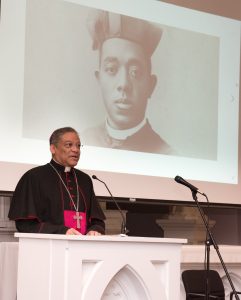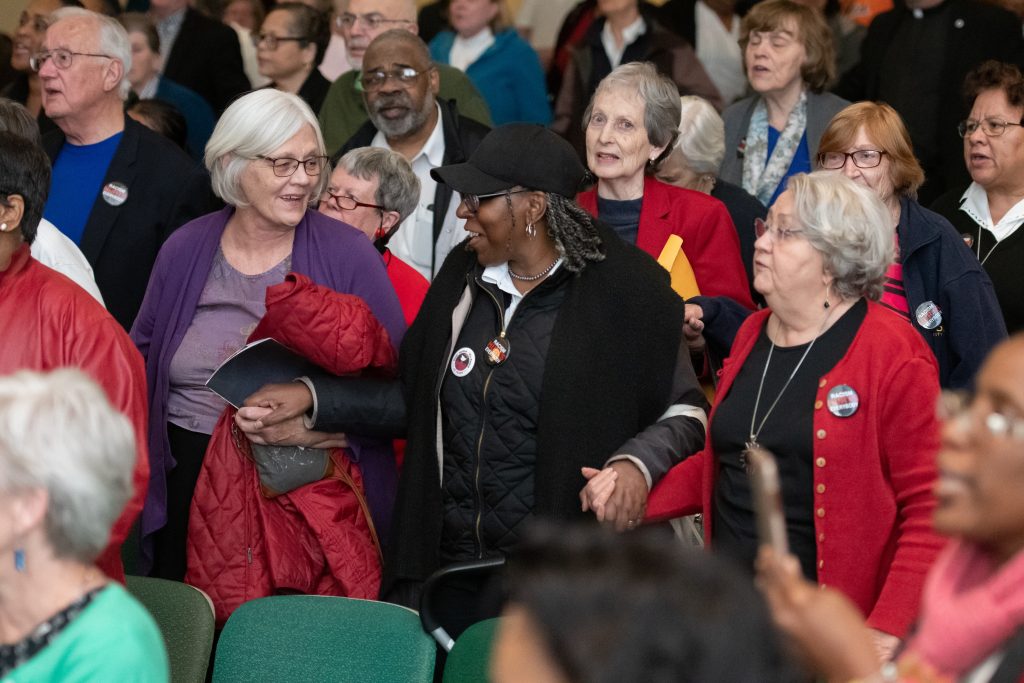As one of the nation’s five active black Catholic bishops, people ask me all the time what they can do to confront the racial problems of our day.
I take their questions as a signal of their sincere desire to live with the tone established for us by the Savior Jesus Christ, a sincere desire to let his Gospel redeem us from the sins of fear, indifference, and racial and ethnic prejudice.
The place to start, I believe, is in our own hearts and in our own little corners of the world. And the first concrete step we need to take is to courageously examine our consciences.
Think about our thoughts and words, our actions or inactions. Do we detect expressions or subtle references to the inferiority of certain peoples?
Have we picked up conscious or unconscious bias regarding peoples of color or other marginalized peoples from our homes and formative environments? How might this have influenced my worldview or determined my assumptions about certain types of people?
Continuing this examination, we want to determine whether we avoid the experiences, the neighborhoods, or the viewpoints of people of color. Do I see people of color as a threat, or do I consider them beneath me or somehow making my life difficult? At the extremes: Do I get anxious or cross the street when I see a person of color walking toward me?

We are believers in Jesus Christ. Our gestures and words should always indicate that we believe the Christian message: that every man, woman, and child has inherent dignity.
In the Gospels, we find a definite pattern in the life of Jesus. He broke through the popular biases and prejudices that plagued the society of his day.
A Jew himself, Jesus was deliberate about his friendships and about including those who were excluded and at the margins of society and the religious community: the sick, those whose lives were morally compromised, the impoverished, Samaritans, Romans, officials, women.
With his parable of the good samaritan, in which he teaches us to see every person as our neighbor, and with his command to love even our enemies, he sets the tone for how we are to live as his disciples.
Needless to say, over the millennia, Jesus’ disciples have not always lived up to the teachings and example of their Master.
Jesus called everyone to conversion of life. And he continues to call us to break through the hesitation and fear endemic to the human condition when we are faced with those who are different from us, whether those differences be racial, economic, or differences in wealth.
From the example of Jesus, we can start to think about how we might make concrete changes in our homes and parishes to think and act more inclusively, with the same love and sensitivity that Jesus demonstrated.
In our homes and parishes, we need to make spaces for our young people to be able to pray and reflect on racism and the social unrest we have been seeing.
And as parents and Church leaders, we need to really listen to their experiences. What do they see happening in their schools with fellow students of different backgrounds, races, or ethnicities?
We need to encourage our young people to be creative, to be ambassadors of friendship and goodwill. Young people have keen observations about what is fair, right, and wrong. We need to invite them to come up with action steps that are meaningful to them.
In Catholic dioceses around the country, bishops have been strategic in trying to increase diversity in ministries, schools, liturgies, and diocesan administrations. This has taken a lot of energy, forethought, and education. It has also taken the humility to admit wrong and correct missteps.
I know this work best in my own Archdiocese of Chicago. In the 1990s, we launched racial sensitivity workshops and other programs for pastors and administrators in our parishes and schools.
More recently, Cardinal Blase Cupich has ordered the creation of a curriculum on race to be included in our elementary and secondary schools.
These kinds of initiatives can make a difference for the next generation of Catholics, who will hopefully see things more clearly and do things better than we are doing now.
Everywhere in the Church, we need to continue to study and explore how racism looks and how it is experienced by people of color. We need to continue to encourage pastors to preach against racism and to take personal responsibility to eradicate subtle traces of racism in parish life.
The United States Catholic bishops have produced many resources to help us. Since 1958, the bishops have produced nearly a dozen major statements at the national level, most recently “Open Wide Our Hearts: The Enduring Call to Love — A Pastoral Letter Against Racism” in 2018. Local bishops around the country have issued their own statements and pastoral letters.
I recommend reading these materials and talking about them in your Bible studies or in small group settings. Broaden your awareness of how structural realities in our society affect minorities’ access to good schools, quality health care, fair paying jobs, and decent housing.
I also encourage people to “schedule” diversity into their lives. We need to be intentional about seeking ways to diversity in our relationships, with co-workers, neighbors, our circles of friends and acquaintances.
Again, it is good to ask: Who are the people you hang around with? Who are your children’s friends? Are they mostly or entirely of one ethnicity?

One practical thing we can do is try to worship occasionally in a Catholic Church where the congregation is predominantly from a different ethnic group. This helps us imbibe a sense of the worth, the offerings of a people, the culture and beauty of a people.
We need to continue to work to build bridges and break down barriers and try to link our parishes and ministries across racial and ethnic lines.
Another idea might be to volunteer at a parish food pantry or meal program; especially bring your children along. Performing the corporal works of mercy deepens your awareness of the needs of others, and how often race plays a part in people’s poverty.
Single-race or predominantly ethnic parishes are not the ideal. Often, unfortunately, our parishes mirror the racial segregation patterns of American neighborhoods. We need to keep working on overcoming these racial divides. In our ministries we need to look for ways to partner and link our parishes across racial, ethnic, and cultural lines. Diocesan-wide events can also be opportunities to bring people together to celebrate our diversity as a Church.
The first Pentecost shows us the beautiful “weave” of the human race, with people from every nation, race, and language all gathered to hear the Gospel. Pentecost shows us that the Church is meant to be a universal community of people. It shows us that nationality, race, ethnicity, language — these uniquely identifying human marks — represent the imprint of a remarkably artistic and loving Creator upon us.
We still have a long way to go in making that Pentecost template a reality in our Church and in our neighborhoods and society.
But Jesus insists that we implement his teachings and that we be lights in the world and the salt of the earth. In other words, Jesus calls us to be the seasoning of life’s experience toward the better. And with him, and working together, we know that we can create more light for our darkness, more courage for our fears, more hope for our disappointments, more wisdom for our confusion, more love for our hate, and more peace for our turmoil.
Much has been accomplished. And much more needs to be done for the honor of God.

